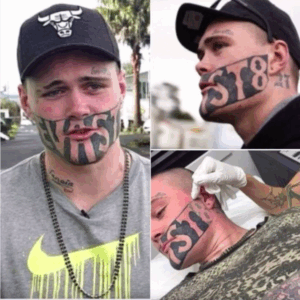Mark Cropp, a young man from New Zealand, never imagined that one reckless decision made in prison would haunt him long after his release. At just over two years into a sentence—precisely two years and three months—for his involvement in a failed drug deal, Mark began to dream of turning his life around. Like many inmates, he wanted a fresh beginning once his time behind bars ended. Unfortunately, a single night of poor judgment created an obstacle that would nearly destroy those hopes.
During his incarceration, Mark and his brother got drunk on a crude, homemade brew that prisoners often made to escape the monotony of confinement. In their intoxicated state, the two decided to tattoo Mark’s face. They lacked professional tools, so they improvised—mixing toothpaste with melted plastic to create a kind of ink. Fueled by impulse and little thought for the consequences, they etched his nickname across his jawline. The bold, black letters spelled “Devast8,” a word that would later symbolize regret and missed opportunities rather than identity or strength.

At the time, Mark explained, he believed the tattoo matched the way he felt about himself. Speaking later to Daily Mail Australia, he confessed: “There was a long time I would devastate everything I touched. Once it was started, I thought, I can’t go back on it now. I wish I had stopped.” That admission summed up not only the origins of the tattoo but also the burden it created once he left prison.
When Mark was finally released, he was determined to rebuild his life, provide for his partner, and support his young daughter. He had skills, motivation, and a genuine desire to work. Yet the first impression he gave to employers was overshadowed by the enormous ink covering his face. Job interview after job interview ended the same way—with rejections. Potential employers could not see past the intimidating mark across his skin, no matter how earnest his intentions were.
For Mark, the tattoo became a constant reminder of the self-destructive behavior of his past and a barrier to the stable future he longed to create. He desperately wanted the tattoo removed, but financial hardship stood in his way. The cost of laser removal treatments was far beyond what he could afford, leaving him trapped between his past mistake and his future dreams.
In an effort to find a way forward, Mark decided to share his struggle publicly. He took a selfie, posted it online, and appealed to the community for help. His story resonated with thousands of people, quickly spreading across social media platforms. Among those who saw his plea was Sacred Tattoo, a well-known tattoo studio in Auckland. The artists at Sacred Tattoo reached out and generously offered to perform the laser removal procedures free of charge.
This act of compassion proved to be the turning point Mark had been praying for. Not only was he given the chance to begin erasing the tattoo that had defined and limited him, but he also regained hope that society was willing to give him another shot at redemption. With the first sessions completed, his appearance began to change, making it easier for him to re-enter the workforce.
Soon after, Mark’s persistence paid off when he was offered employment with PR Contracting, where he earned $22 an hour. It was not just a job—it was a lifeline that allowed him to provide for his family, regain dignity, and finally step into the second chance he had been chasing since leaving prison.
Mark Cropp’s story is more than a tale about a tattoo gone wrong. It is a reflection of human vulnerability, the weight of regret, and the incredible impact that kindness from strangers can have on someone’s life. It shows how social media, often criticized for its flaws, can also be a force for good—connecting people in need with those willing to help. Most of all, it is a reminder that while mistakes can leave permanent marks, redemption and change are always possible when society offers understanding and second chances.


